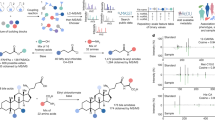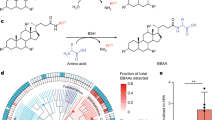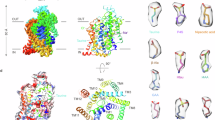Abstract
ABSTRACT: We studied the effects of amino acids which undergo Na+-coupled cotransport on taurocholate uptake by basolateral liver plasma membrane vesicles prepared from 14-day-old rats. At concentrations similar to the total concentration of Na-dependent amino acids measured in portal blood, the Na+-dependent amino acids, L-alanine and L-glutamine, reduced the initial velocity of Na+-dependent taurocholate uptake and impaired uphill transport of the bile acid. In contrast, the Na+-independent amino acid, 2-aminobicyclo(2,2,1)heptane-2-carboxylic acid, did not affect taurocholate uptake. The inhibitory effect of Na+- dependent amino acids on taurocholate uptake was dose dependent. Taurocholate uptake was electroneutral and the inhibition of bile acid uptake by L-glutamine was not affected by the electrical potential. In the absence of a sodium gradient, but with equal intravesicular and extravesicular sodium concentrations, L-glutamine did not inhibit bile acid uptake. With an inwardly directed Na+ gradient, 22Na+ uptake (8 s) was 27% higher in the presence of L-glutamine (5 mM) than without L-glutamine. Kinetic analysis showed that L-glutamine (5 mM) decreased the maximum velocity of Na+-dependent taurocholate uptake to 59% of control (1.62 ± 0.20 versus 2.73 ± 030 nmol-mg-1 protein -min-1; p < 0.002), but had no effect on the taurocholate Km (91.7 ± 26.4 versus 97.1 ± 25.4 nM). We conclude that physiologic concentrations of Na+-dependent amino acids markedly inhibit taurocholate uptake by membrane vesicles from 14-day rat livers. Amino acid inhibition of bile acid uptake is noncompetitive and probably due to accelerated dissipation of the inwardly directed transmembrane Na+-gradient. The earlier maturation of hepatic transport of amino acids compared to bile acids suggest that amino acid inhibition of bile acid uptake may further reduce hepatic clearance of bile acids during development and contribute to the elevation of serum bile acid concentrations. This effect may explain in part the propensity of newborn infants to cholestasis in association with parenteral infusion of amino acids.
Similar content being viewed by others
Log in or create a free account to read this content
Gain free access to this article, as well as selected content from this journal and more on nature.com
or
Author information
Authors and Affiliations
Rights and permissions
About this article
Cite this article
Bucuvalas, J., Goodrich, A., Blitzer, B. et al. Amino Acids Are Potent Inhibitors of Bile Acid Uptake by Liver Plasma Membrane Vesicles Isolated from Suckling Rats. Pediatr Res 19, 1298–1304 (1985). https://doi.org/10.1203/00006450-198512000-00019
Received:
Accepted:
Issue date:
DOI: https://doi.org/10.1203/00006450-198512000-00019
This article is cited by
-
Could lipid infusion be a risk for parenteral nutrition-associated cholestasis in low birth weight neonates?
European Journal of Pediatrics (2008)
-
Influence of intrauterine growth retardation on parameters of liver function in low birth weight infants
European Journal of Pediatrics (1990)



